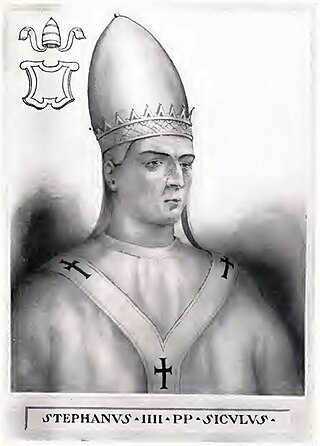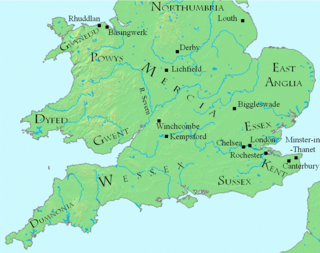Related Research Articles

Year 821 (DCCCXXI) was a common year starting on Tuesday of the Julian calendar.
The 800s decade ran from January 1, 800, to December 31, 809.
Year 800 (DCCC) was a leap year starting on Wednesday of the Julian calendar, the 800th year of the Common Era (CE) and Anno Domini (AD) designations, the 800th year of the 1st millennium, the 100th and last year of the 8th century, and the 1st year of the 800s decade. It was around this time that the Anno Domini calendar era became the prevalent method in Europe for naming years, so from this time on, the years began to be known as 800 and onwards.
The 790s decade ran from January 1, 790, to December 31, 799.
The 780s decade ran from January 1, 780, to December 31, 789.
The 770s decade ran from January 1, 770, to December 31, 779.

Year 816 (DCCCXVI) was a leap year starting on Tuesday of the Julian calendar, the 816th year of the Common Era (CE) and Anno Domini (AD) designations, the 816th year of the 1st millennium, the 16th year of the 9th century, and the 7th year of the 810s decade.

Year 840 (DCCCXL) was a leap year starting on Thursday in the Julian calendar, the 840th year of the Common Era (CE) and Anno Domini (AD) designations, the 840th year of the 1st millennium, the 40th year of the 9th century, and the 1st year of the 840s decade.

Year 774 (DCCLXXIV) was a common year starting on Saturday of the Julian calendar. The denomination 774 for this year has been used since the early medieval period, when the Anno Domini calendar era became the prevalent method in Europe for naming years.

Year 808 (DCCCVIII) was a leap year starting on Saturday of the Julian calendar, the 808th year of the Common Era (CE) and Anno Domini (AD) designations, the 808th year of the 1st millennium, the 8th year of the 9th century, and the 9th year of the 800s decade.

Year 777 (DCCLXXVII) was a common year starting on Wednesday of the Julian calendar, the 777th year of the Common Era (CE) and Anno Domini (AD) designations, the 777th year of the 1st millennium, the 77th year of the 8th century, and the 8th year of the 770s decade. The denomination 777 for this year has been used since the early medieval period, when the Anno Domini calendar era became the prevalent method in Europe for naming years.

Year 778 (DCCLXXVIII) was a common year starting on Thursday of the Julian calendar, the 778th year of the Common Era (CE) and Anno Domini (AD) designations, the 778th year of the 1st millennium, the 78th year of the 8th century, and the 9th year of the 770s decade. The denomination 778 for this year has been used since the early medieval period, when the Anno Domini calendar era became the prevalent method in Europe for naming years.

Year 779 (DCCLXXIX) was a common year starting on Friday of the Julian calendar. The denomination 779 for this year has been used since the early medieval period, when the Anno Domini calendar era became the prevalent method in Europe for naming years.

Year 780 (DCCLXXX) was a leap year starting on Saturday of the Julian calendar, the 780th year of the Common Era (CE) and Anno Domini (AD) designations, the 780th year of the 1st millennium, the 80th year of the 8th century, and the 1st year of the 780s decade. The denomination 780 for this year has been used since the early medieval period, when the Anno Domini calendar era became the prevalent method in Europe for naming years.

Year 784 (DCCLXXXIV) was a leap year starting on Thursday of the Julian calendar, the 784th year of the Common Era (CE) and Anno Domini (AD) designations, the 784th year of the 1st millennium, the 84th year of the 8th century, and the 5th year of the 780s decade. The denomination 784 for this year has been used since the early medieval period, when the Anno Domini calendar era became the prevalent method in Europe for naming years.

Year 785 (DCCLXXXV) was a common year starting on Saturday of the Julian calendar. The article denomination 785 for this year has been used since the early medieval period, when the Anno Domini calendar era became the prevalent method in Europe for naming years. It is still used today in this manner.

Year 796 (DCCXCVI) was a leap year starting on Friday of the Julian calendar, the 796th year of the Common Era (CE) and Anno Domini (AD) designations, the 796th year of the 1st millennium, the 96th year of the 8th century, and the 7th year of the 790s decade. The denomination 796 for this year has been used since the early medieval period, when the Anno Domini calendar era became the prevalent method in Europe for naming years.

Year 797 (DCCXCVII) was a common year starting on Sunday of the Julian calendar. The denomination 797 for this year has been used since the early medieval period, when the Anno Domini calendar era became the prevalent method in Europe for naming years.

Year 798 (DCCXCVIII) was a common year starting on Monday of the Julian calendar, the 798th year of the Common Era (CE) and Anno Domini (AD) designations, the 798th year of the 1st millennium, the 98th year of the 8th century, and the 9th year of the 790s decade. The denomination 798 for this year has been used since the early medieval period, when the Anno Domini calendar era became the prevalent method in Europe for naming years.
Eardwulf was king of Northumbria from 796 to 806, when he was deposed and went into exile. He may have had a second reign from 808 until perhaps 811 or 830. Northumbria in the last years of the eighth century was the scene of dynastic strife between several noble families: in 790, king Æthelred I attempted to have Eardwulf assassinated. Eardwulf's survival may have been viewed as a sign of divine favour. A group of nobles conspired to assassinate Æthelred in April 796 and he was succeeded by Osbald: Osbald's reign lasted only twenty-seven days before he was deposed and Eardwulf became king on 14 May 796.
References
- ↑ Guidoboni et al. 2018.
- ↑ Nicolle 2014, p. 21.
- ↑ Cubitt, Catherine (1995). Anglo-Saxon Church Councils c.650–c.850. London: Leicester University Press. p. 279. ISBN 0-7185-1436-X.
Sources
- Guidoboni, E.; Ferrari, G.; Mariotti, D.; Comastri, A.; Tarabusi, G.; Sgattoni, G.; Valensise, G. (2018). "801 04 29, 20:00 Roma (Italy)". Catalogo dei Forti Terremoti in Italia (461 a.C.–1997) e nell'area Mediterranea (760 a.C.–1500). Istituto Nazionale di Geofisica e Vulcanologia.
- Nicolle, David (2014). The Conquest of Saxony AD 782–785. ISBN 978-1-78200-825-5.